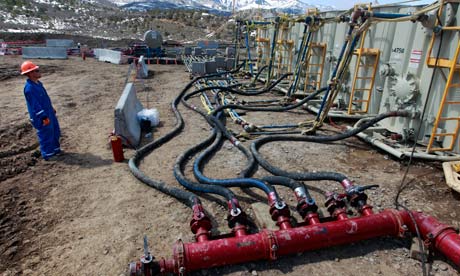I hate to say I told you so, but...
In 2012, the International Energy Agency (IEA) forecast that the US would outpace Saudi Arabia in oil production thanks to the shale boom by 2020, becoming a net exporter by 2030. The forecast was seen by many as decisive evidence of the renewal of the oil age, while informed detractors were at best ignored, at worst ridiculed.
Among my many reports exposing the geological and economic fallacies behind the shale boom narrative are this, this, this and this.
Even here on the Guardian, one headline declared the IEA report shows that "peak oil idea has gone up in flames."
But the IEA's latest assessment has proved the detractors right all along. The agency's World Energy Investment Outlook released this week says that US tight oil production - which draws largely from the Bakken in North Dakota and the Eagle Ford in Texas - will peak around 2020 before declining.
The new analysis puts an end to the '100 year supply' myth widely promulgated by industry, and moves closer to the more sceptical assessment of a US tight oil peak within this decade.
The IEA report says:
"... output from North America plateaus [from around 2020] and then falls back from the mid-2020s onwards."
The shortfall will make the US, and countries in Europe looking to import from America, increasingly dependent on Middle East supplies:
"Yet there is a risk that Middle East investment fails to pick up in time to avert a shortfall in supply, because of an uncertain investment climate in some countries and the priority often given to spending in other areas."
The IEA pointed out that in the wake of the Arab spring, Middle East oil states are feeling the pressure to divert massive oil subsidies which maintain production into more social spending to alleviate instability. If they don't, they could topple.
These countries already pour $800 billion in annual oil revenue into energy subsidies - and if they fail to cover the predicted shortfall due to the post-peak fall in US output, by 2025 the average cost of a barrel of oil could climb up by $15.
This March, when I broached them about the danger of an imminent oil shock, I was told confidently by a spokesperson at the UK Department for Energy and Climate Change that there was no risk of the lights going out - UK energy policy had it sorted.
Now IEA chief economist Fatih Birol says:
"In Europe we are facing the risk of the lights going off. This is not a joke."
We need $48 trillion of new investment to keep the lights on - and it's far from clear that investing in increasingly expensive unconventional oil and gas is going to cut it, without serious impacts on the global economy.
Currently, already, the IEA report reveals that over 80% of oil company investment is going into making up for exhausted fields where production is in decline. The agency also calls to ramp up investments in renewables and increasing efficiency, along with regulatory reform to incentivise investments, as part of the package.
While the fossil fuel empire is crumbling, the renewable energy sector has received 60% of total investment in power plants from 2000 to 2012.
Those who keep banking on fossil fuels to solve our energy and economic woes should take stock - they ain't the answer. The time to ween well off was yesterday.
Dr. Nafeez Ahmed is an international security journalist and academic. He is the author of A User's Guide to the Crisis of Civilization: And How to Save It, and the forthcoming science fiction thriller, Zero Point. Follow him on Facebook and Twitter @nafeezahmed.

View all comments >
comments
Sign in or create your Guardian account to join the discussion.
This discussion is closed for comments.
We’re doing some maintenance right now. You can still read comments, but please come back later to add your own.
Commenting has been disabled for this account (why?)